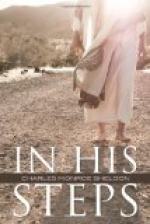“The news is positively and without reservation on the side of the new movement. We shall henceforth do all in our power to drive out the saloon and destroy its political strength. We shall advocate the election of the men nominated by the majority of citizens met in the first primary and we call upon all Christians, church members, lovers of right, purity, temperance, and the home, to stand by President Marsh and the rest of the citizens who have thus begun a long-needed reform in our city.”
President Marsh read this editorial and thanked God for Edward Norman. At the same time he understood well enough that every other paper in Raymond was on the other side. He did not underestimate the importance and seriousness of the fight which was only just begun. It was no secret that the news had lost enormously since it had been governed by the standard of “What would Jesus do?” And the question was, Would the Christian people of Raymond stand by it? Would they make it possible for Norman to conduct a daily Christian paper? Or would the desire for what is called news in the way of crime, scandal, political partisanship of the regular sort, and a dislike to champion so remarkable a reform in journalism, influence them to drop the paper and refuse to give it their financial support? That was, in fact, the question Edward Norman was asking even while he wrote that Saturday editorial. He knew well enough that his actions expressed in that editorial would cost him very heavily from the hands of many business men in Raymond. And still, as he drove his pen over the paper, he asked another question, “What would Jesus do?” That question had become a part of this whole life now. It was greater than any other.
But for the first time in its history Raymond had seen the professional men, the teachers, the college professors, the doctors, the ministers, take political action and put themselves definitely and sharply in public antagonism to the evil forces that had so long controlled the machine of municipal government. The fact itself was astounding. President Marsh acknowledged to himself with a feeling of humiliation, that never before had he known what civic righteousness could accomplish. From that Friday night’s work he dated for himself and his college a new definition of the worn phrase “the scholar in politics.” Education for him and those who were under his influence ever after meant some element of suffering. Sacrifice must now enter into the factor of development.
At the Rectangle that week the tide of spiritual life rose high, and as yet showed no signs of flowing back. Rachel and Virginia went every night. Virginia was rapidly reaching a conclusion with respect to a large part of her money. She had talked it over with Rachel and they had been able to agree that if Jesus had a vast amount of money at His disposal He might do with some of it as Virginia planned. At any rate they felt that whatever He might do in such case would have as large an element of variety in it as the differences in persons and circumstances. There could be no one fixed Christian way of using money. The rule that regulated its use was unselfish utility.




